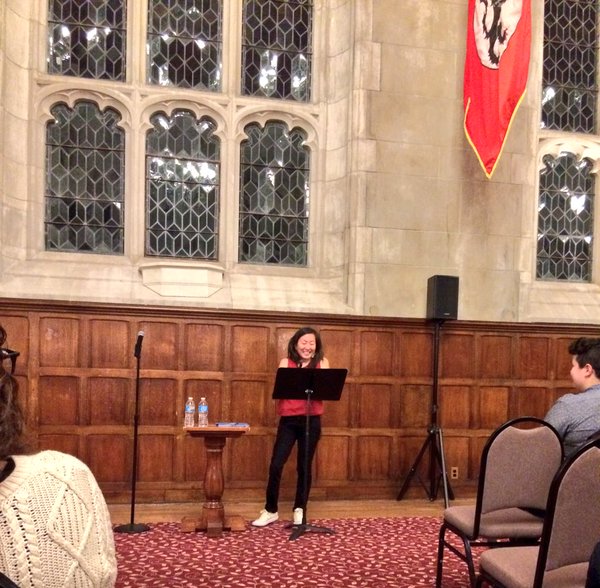Mia Mingus, a writer, community educator and organizer working for disability justice and transformative justice, gave her keynotes titled “A Queer Love Like This” tonight in Thomas Great Hall. She is a queer physically disabled Korean woman transracial and transnational adoptee, born in Korea, raised in the Caribbean and the U.S. South, and now living in Northern California.
What does it mean to queer love? Not the shallow type of love sold to us, but the kind of love which propels people to risk their lives for other, the kind of love that is sacred, limitless, boundless, deep, timeless…
At the start of her talk, Mia defined the differences between being politically queer versus descriptively queer. Descriptively queer meant to have lived the experiences of being queer. Politically queer meant to identify in solidarity with the queer movement. You could be politically queer, but not descriptively queer, and vice versa. Mia was going to focus on political queerness.
As an organizer and activist, Mia stressed the importance of love and skills. First and foremost, you must have the love for liberation. Through love, you build the courage and heart to care. This alone is not enough. It’s impossible to build utopias to solve issues that require multiple players and generations of time. Skills solve problems, not ideas. The best analysis in the world is useless if we don’t know how to love. How do you build these skills? Education. Working. Practice & Spectacular Failures. There exists a balance in figuring out how to resist our current corrupt system and creating alternatives to that system.
According to Mingus, our inability to respond to our community affects our ability to respond to other issues outside of our community. Understanding organizing as a spiritual practice is just as much about our souls as it is about our goals. What kind of collective legacy do we want to lead?
=========
This talk was a lot more philosophical than I expected. Mingus has helped me recognize that I am not descriptively queer, but I am politically queer. I agree that activism takes love for liberation and skills, but I’m still confused about what these “skills” actually are. I would love to continue to be involved in my community and take a stand towards social justice, but I can’t justify doing just that with no means of supporting myself financially. I remember when Supreme Court Justice Sonia Sotomayor came to Bryn Mawr College. Her advice to a student who wanted to become a social justice organizer was to not become a lawyer. I recall it was because the system is too frustrating to deal with as a lawyer fighting for social justice. Are skills always necessary for certain jobs? Why do we go to college? Why do we go to graduate school? Why is it important for women (of color) to go to college? What does this all mean for the queer movement? Should the skills I am learning in college be more technical or humanities based? Does it ensure the safety and well being of my client that I have a degree from a top notch liberal arts college? I feel that in the eyes of capitalism and the White cis-gendered patriarchy, these “skills” are good signifiers of legitimacy and voice.
Thank you to Spectra and the Pensby Center for organizing this talk. Mia’s writings can be found at leavingevidence.wordpress.com.
Update:
We have one answer to skills: The liberal arts aren’t all about job prospects
The liberal arts ideally teach us how to live together, how to listen to, consider, and care about the life experience of others, how to be more than ravenously self-interested, concerned with only our own plots and machinations. To be an educated person is not a skillset; it is a way of being oriented towards the world and the other people in it.
— The Swarthmore Phoenix

